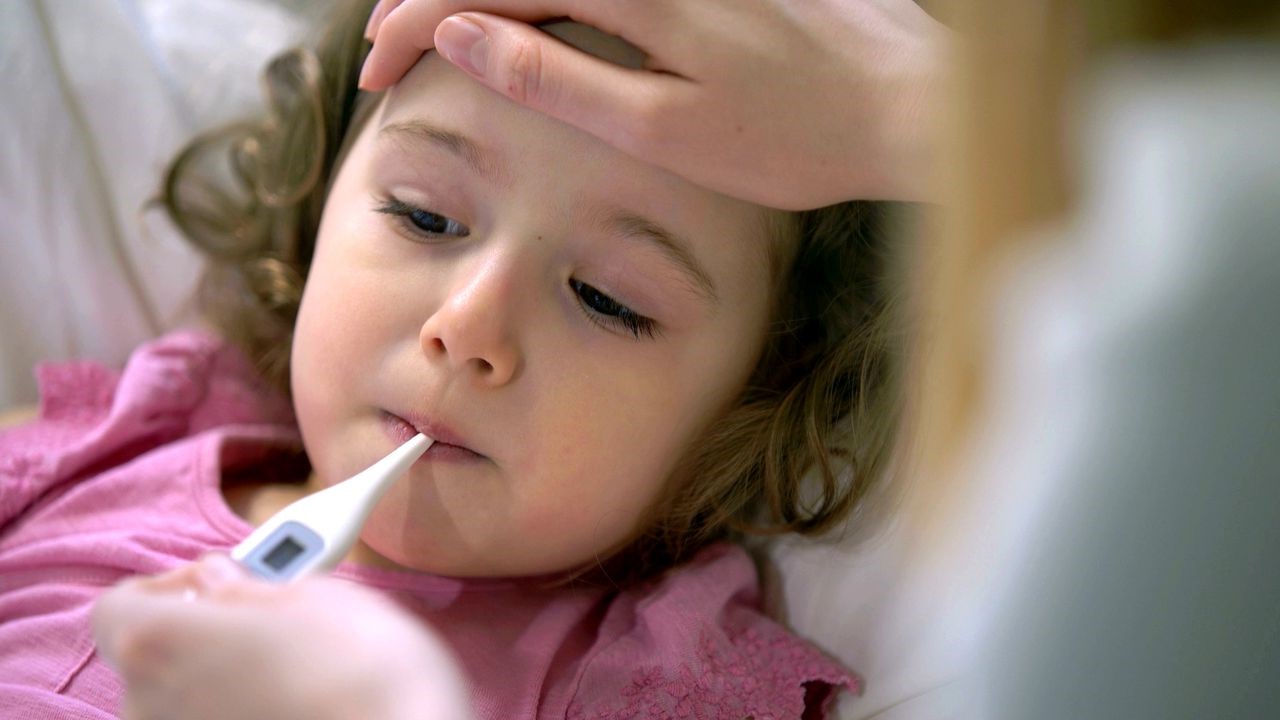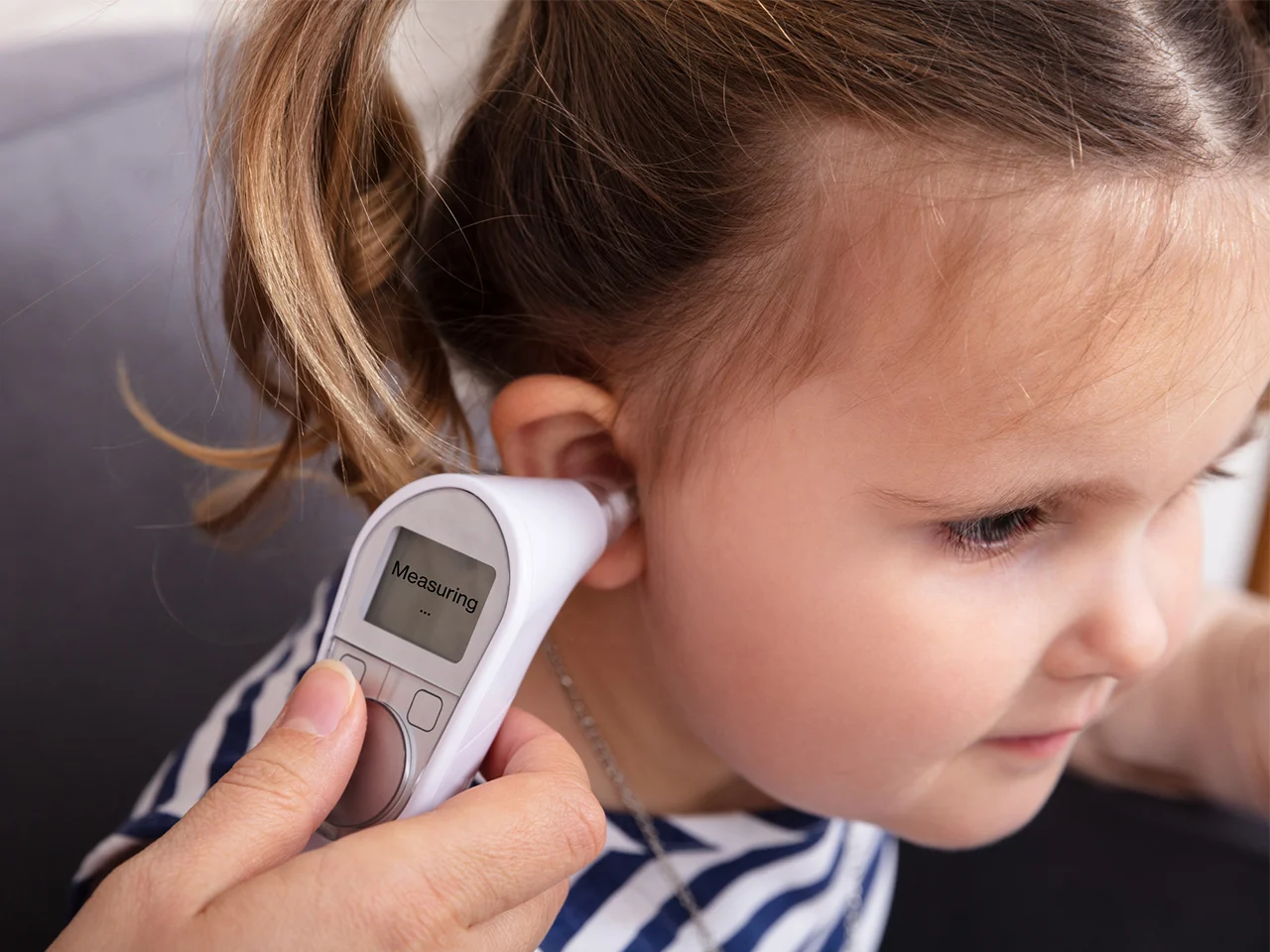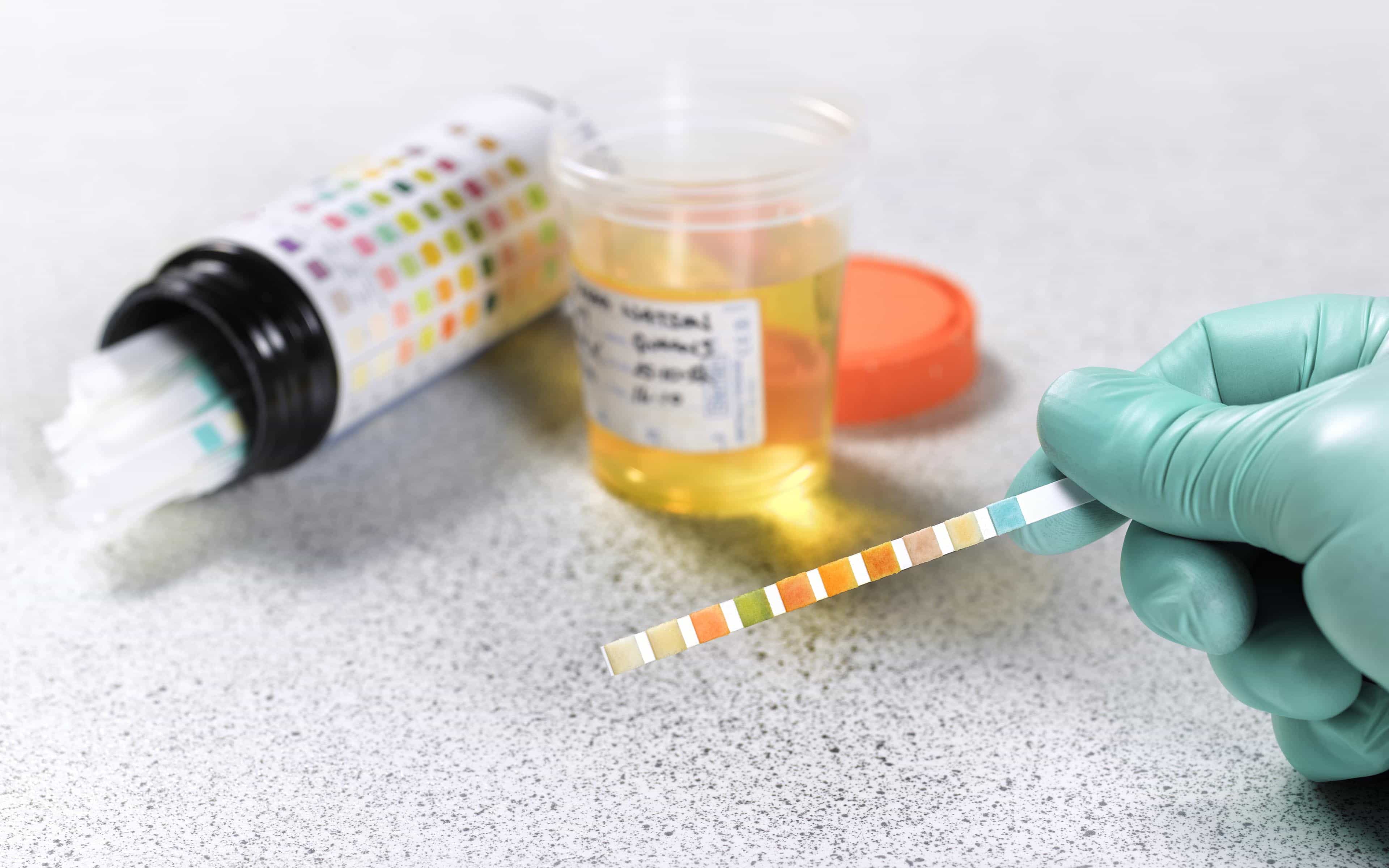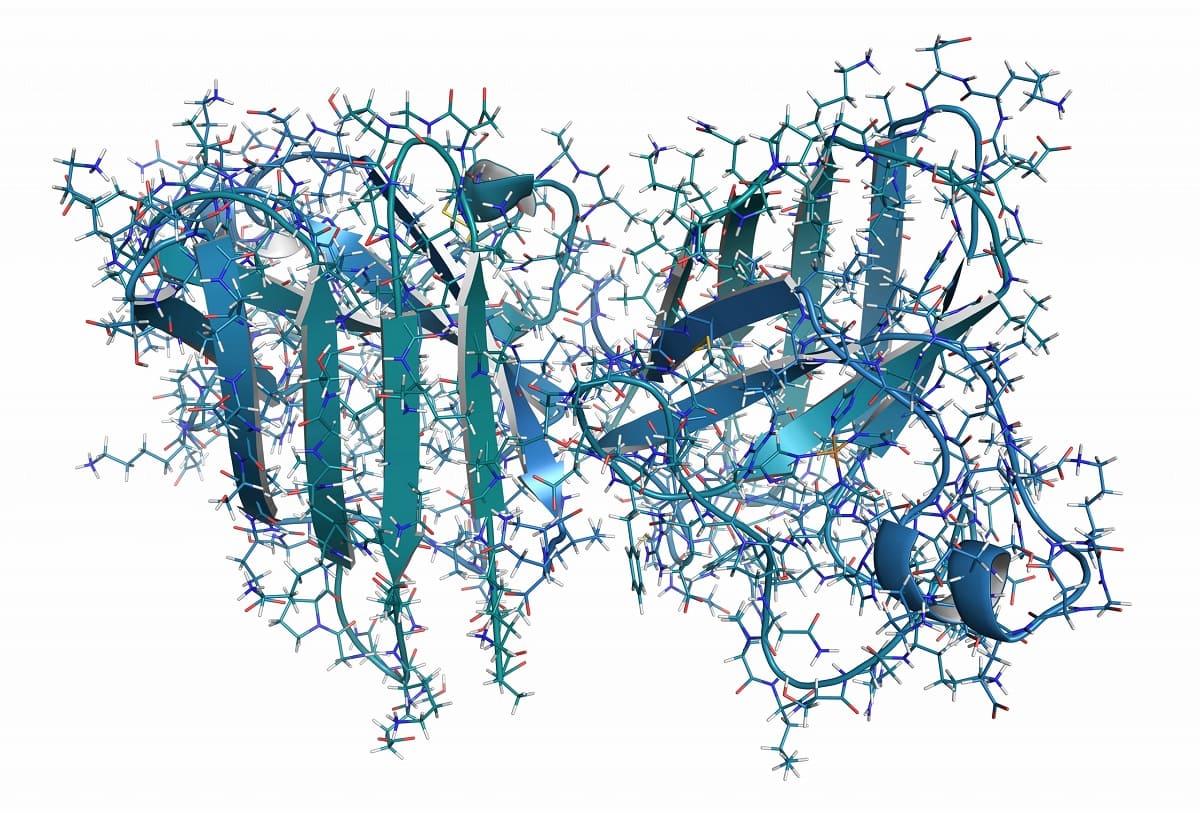Home>Health & Nutrition>Understanding Fevers In Toddlers: Causes, Symptoms, And Treatment


Health & Nutrition
Understanding Fevers In Toddlers: Causes, Symptoms, And Treatment
Modified: March 6, 2024
Learn about the causes, symptoms, and treatment of fevers in toddlers. Get expert advice on health and nutrition for your little one.
(Many of the links in this article redirect to a specific reviewed product. Your purchase of these products through affiliate links helps to generate commission for Temperatures.com, at no extra cost. Learn more)
Table of Contents
Introduction
Fevers in toddlers can be a cause of concern for many parents and caregivers. When a toddler develops a fever, it often triggers worry and anxiety, as it is natural to be concerned about the well-being of the little one. Understanding the causes, symptoms, and appropriate treatments for fevers in toddlers is crucial for providing the best care and ensuring their comfort.
Fevers are a common occurrence in toddlers and are often a sign that the body is fighting off an infection. While a fever itself is not an illness, it is a symptom that indicates the body's immune system is responding to an underlying cause. In most cases, fevers in toddlers are not a cause for alarm and can be managed effectively at home. However, it is essential to be able to recognize when a fever may indicate a more serious condition that requires medical attention.
As a parent or caregiver, it is important to stay informed about the potential causes of fevers in toddlers, the symptoms to watch out for, and the appropriate steps to take to provide comfort and relief. By being knowledgeable about fevers in toddlers, you can approach the situation with confidence and take the necessary actions to ensure the well-being of the child.
In this comprehensive guide, we will explore the common causes of fevers in toddlers, how to recognize the symptoms, when to seek medical attention, home remedies for managing fevers, and the available medical treatment options. By gaining a deeper understanding of fevers in toddlers, you will be better equipped to navigate this common childhood occurrence and provide the best possible care for your little one.
Common Causes of Fevers in Toddlers
Fevers in toddlers can stem from various underlying causes, many of which are related to the body's natural response to infections. Understanding the common triggers of fevers in toddlers is essential for identifying potential sources of discomfort and addressing them effectively. Here are the primary causes of fevers in toddlers:
-
Viral Infections: Toddlers are often susceptible to viral infections, such as the common cold, flu, and respiratory syncytial virus (RSV). These infections can lead to fevers as the body works to combat the invading viruses.
-
Bacterial Infections: Bacterial infections, including ear infections, urinary tract infections, and strep throat, are common culprits of fevers in toddlers. These infections can cause the body's temperature to rise as the immune system responds to the presence of harmful bacteria.
-
Teething: The process of teething can also cause low-grade fevers in toddlers. As new teeth emerge, the body's inflammatory response can result in a slight increase in body temperature.
-
Immunizations: Following routine vaccinations, toddlers may experience a mild fever as a normal immune response to the vaccine components. This typically resolves within a day or two.
-
Gastrointestinal Infections: Viral or bacterial infections affecting the gastrointestinal tract, such as stomach flu or food poisoning, can lead to fevers in toddlers along with symptoms like vomiting and diarrhea.
-
Environmental Factors: Exposure to extreme temperatures, particularly heat, can lead to fevers in toddlers. Additionally, overdressing or being in a hot environment can contribute to an elevation in body temperature.
-
Inflammatory Conditions: Inflammatory conditions such as Kawasaki disease or juvenile rheumatoid arthritis can also manifest with fevers in toddlers, often accompanied by other symptoms that warrant medical evaluation.
Understanding these common causes of fevers in toddlers can help parents and caregivers identify potential sources of discomfort and take appropriate measures to address the underlying issues. By recognizing the specific cause of a toddler's fever, it becomes easier to provide targeted care and support to alleviate their symptoms and promote recovery.
Recognizing Symptoms of Fevers in Toddlers
Recognizing the symptoms of fevers in toddlers is crucial for effectively addressing their discomfort and ensuring appropriate care. While a fever itself is an indication of the body's immune response, it is essential to be attentive to accompanying signs that may provide insights into the underlying cause and severity of the fever. Here are the key symptoms to watch for when a toddler has a fever:
-
Elevated Body Temperature: The most obvious sign of a fever in toddlers is an elevated body temperature. A rectal temperature above 100.4°F (38°C) is generally considered a fever in young children. While a fever alone may not always indicate a serious condition, monitoring the degree of the fever is important for assessing the child's comfort and determining the need for intervention.
-
Changes in Behavior: Toddlers with fevers may exhibit changes in behavior, such as increased irritability, fussiness, or lethargy. They may appear more clingy or less interested in their usual activities. These behavioral changes can provide valuable clues about the toddler's level of discomfort and overall well-being.
-
Decreased Appetite: Fevers in toddlers can often lead to a decreased appetite. They may show reluctance to eat or drink, which can contribute to concerns about dehydration. Encouraging fluid intake and offering small, easily digestible meals can help support the child's nutritional needs during this time.
-
Sleep Disturbances: Fevers may disrupt a toddler's sleep patterns, leading to restlessness or difficulty falling asleep. It is not uncommon for toddlers with fevers to experience disrupted sleep, which can further contribute to their overall sense of discomfort.
-
Respiratory Symptoms: In some cases, fevers in toddlers may be accompanied by respiratory symptoms such as coughing, nasal congestion, or rapid breathing. These respiratory manifestations can provide insights into potential underlying infections, particularly if the fever is associated with symptoms of a cold or flu.
-
Skin Changes: Observing the toddler's skin can also offer valuable information. Skin may feel warm to the touch, and the child may appear flushed or sweaty. Monitoring skin changes can help gauge the intensity of the fever and the body's response to it.
-
Other Associated Symptoms: Depending on the underlying cause of the fever, toddlers may exhibit additional symptoms such as ear pain, urinary discomfort, rash, or gastrointestinal disturbances. These associated symptoms can aid in identifying the specific source of the fever and guiding appropriate interventions.
By being attentive to these symptoms, parents and caregivers can gain a more comprehensive understanding of a toddler's condition when they have a fever. This awareness enables them to provide targeted care, seek medical attention when necessary, and offer comfort to the little one during this period of discomfort.
When to Seek Medical Attention for a Toddler's Fever
While fevers in toddlers are often caused by common viral infections and typically resolve with home care, there are instances where seeking medical attention is crucial to ensure the child's well-being. Understanding when to seek medical help for a toddler's fever is essential for prompt intervention and appropriate management. Here are the circumstances that warrant seeking medical attention for a toddler's fever:
-
High Fever: If a toddler's fever is persistent and reaches or exceeds 102°F (38.9°C), especially in younger children, it is advisable to consult a healthcare professional. High fevers can indicate a more serious underlying infection or condition that requires medical evaluation and intervention.
-
Duration of Fever: If a toddler's fever persists for more than 3 days, it is important to seek medical advice. Prolonged fevers may signal an unresolved infection or an underlying health issue that necessitates thorough assessment by a healthcare provider.
-
Unusual Symptoms: When a toddler's fever is accompanied by unusual or concerning symptoms such as severe headache, stiff neck, persistent vomiting, difficulty breathing, or a rash that does not fade with pressure, immediate medical attention is warranted. These symptoms may indicate a more serious illness or infection that requires prompt evaluation and treatment.
-
Underlying Health Conditions: For toddlers with pre-existing health conditions or compromised immune systems, any fever should prompt a consultation with a healthcare provider. Children with chronic illnesses or immunodeficiencies may be at higher risk for complications from fevers and require specialized care.
-
Dehydration: If a toddler with a fever shows signs of dehydration, such as decreased urination, dry mouth, sunken eyes, or extreme fussiness, medical attention should be sought. Dehydration can exacerbate the effects of a fever and may necessitate medical intervention to restore the child's fluid balance.
-
Parental Concerns: Trusting parental instincts is crucial. If a parent or caregiver feels deeply concerned about a toddler's fever, even if the symptoms do not align with the aforementioned criteria, seeking medical advice is warranted. Parents are in the best position to recognize changes in their child's health and well-being.
In these situations, it is important to promptly contact a healthcare provider or seek medical care at an urgent care facility or emergency department. Timely medical assessment can help identify the underlying cause of the fever, initiate appropriate treatment, and provide reassurance to parents and caregivers.
By being attentive to these guidelines and seeking medical attention when necessary, parents and caregivers can ensure that toddlers receive the appropriate care and support during episodes of fever, promoting their comfort and well-being.
Home Remedies for Managing Fevers in Toddlers
When a toddler develops a fever, it is natural for parents and caregivers to seek ways to alleviate their discomfort and promote recovery. While medical intervention may be necessary in certain circumstances, there are several home remedies that can help manage fevers in toddlers and provide them with comfort during this time.
-
Maintain Hydration: Encouraging the toddler to drink plenty of fluids is essential for preventing dehydration, especially when they have a fever. Offer water, clear broths, diluted fruit juices, or oral rehydration solutions at regular intervals to ensure adequate hydration.
-
Comfortable Clothing and Environment: Dressing the toddler in lightweight, breathable clothing can help regulate their body temperature. Additionally, maintaining a comfortable room temperature and using fans or cool compresses can aid in reducing the child's fever.
-
Rest and Sleep: Ensuring that the toddler gets plenty of rest is crucial for supporting their immune system during a fever. Create a calm and soothing environment to promote relaxation and facilitate uninterrupted sleep.
-
Warm Baths: A lukewarm bath can help lower a toddler's body temperature and provide relief from fever-related discomfort. Avoid using cold water, as it can cause shivering and potentially elevate the fever.
-
Fever-Reducing Medications: Over-the-counter fever reducers such as acetaminophen or ibuprofen, when used according to the appropriate dosage for the child's age and weight, can help lower the toddler's fever and alleviate associated symptoms. It is important to consult a healthcare provider before administering any medication to a toddler.
-
Comforting Measures: Offering comfort and reassurance to the toddler is essential during a fever. Providing extra cuddles, reading stories, or engaging in quiet activities can help distract the child and alleviate their distress.
-
Nutritious, Easily Digestible Foods: While a decreased appetite is common during a fever, offering small, nutritious meals and snacks can support the toddler's nutritional needs. Opt for easily digestible foods such as soups, crackers, fruits, and yogurt.
By implementing these home remedies, parents and caregivers can effectively manage fevers in toddlers and provide them with the necessary care and support. It is important to monitor the child's symptoms and seek medical attention if the fever persists or is accompanied by concerning signs. With attentive care and appropriate interventions, toddlers can recover from fevers and resume their usual activities with restored comfort and well-being.
Read more: Understanding Fever: Causes And Symptoms
Medical Treatment Options for Fevers in Toddlers
In cases where home remedies and supportive care are insufficient in managing a toddler's fever, medical treatment options may be necessary to address the underlying cause and alleviate the child's discomfort. It is important to note that the administration of any medication to a toddler should be done under the guidance and supervision of a healthcare professional. Here are the medical treatment options commonly considered for fevers in toddlers:
-
Fever-Reducing Medications: Acetaminophen and ibuprofen are commonly used to lower fevers and provide relief from associated symptoms in toddlers. These medications help to reduce the body's temperature and alleviate discomfort, making it easier for the child to rest and recover. It is crucial to follow the recommended dosage based on the toddler's age and weight, as excessive or incorrect use of these medications can pose risks to the child's health.
-
Antibiotics: In cases where a bacterial infection is identified as the cause of the toddler's fever, healthcare providers may prescribe antibiotics to target the specific bacteria and facilitate recovery. It is important to complete the full course of antibiotics as prescribed, even if the child's symptoms improve, to ensure the infection is fully eradicated.
-
Antiviral Medications: For toddlers with fevers caused by certain viral infections, such as influenza or herpes simplex virus, antiviral medications may be considered to reduce the severity and duration of the illness. These medications work by inhibiting the replication of the virus and supporting the body's immune response.
-
Fluid Replacement Therapy: In cases where a toddler is at risk of dehydration due to fever-related fluid loss, healthcare providers may recommend oral rehydration solutions or, in severe cases, intravenous (IV) fluids to restore the child's fluid balance. Proper hydration is essential for supporting the body's immune function and promoting recovery.
-
Diagnostic Testing and Evaluation: In situations where the cause of the toddler's fever is unclear or when concerning symptoms are present, healthcare providers may perform diagnostic tests such as blood tests, urine analysis, or imaging studies to identify the underlying source of the fever. This comprehensive evaluation helps guide targeted treatment and ensures appropriate care for the child.
-
Hospitalization and Monitoring: In rare cases where a toddler's fever is associated with a severe infection or underlying health condition, hospitalization may be necessary for close monitoring and intensive medical intervention. Hospital-based care ensures that the child receives specialized treatment and round-the-clock attention from healthcare professionals.
It is important for parents and caregivers to communicate openly with healthcare providers regarding the toddler's symptoms, medical history, and any concerns they may have. By working collaboratively with healthcare professionals, parents can ensure that the toddler receives the most appropriate and effective medical treatment for their fever, promoting a swift and successful recovery.
By understanding the available medical treatment options for fevers in toddlers, parents and caregivers can approach the management of a child's fever with confidence and ensure that the child receives the best possible care to support their well-being.
Conclusion
In conclusion, understanding fevers in toddlers is essential for parents and caregivers to navigate this common childhood occurrence with confidence and provide the best possible care for their little ones. Fevers, while often a sign of the body's natural response to infections, can trigger worry and anxiety. By gaining insights into the causes, symptoms, and appropriate treatments for fevers in toddlers, parents and caregivers can effectively manage these episodes and ensure the comfort and well-being of their children.
Recognizing the common causes of fevers in toddlers, including viral and bacterial infections, teething, immunizations, and environmental factors, empowers parents to identify potential sources of discomfort and address them effectively. Additionally, being attentive to the symptoms of fevers in toddlers, such as elevated body temperature, changes in behavior, and respiratory manifestations, enables parents to provide targeted care and seek medical attention when necessary.
Knowing when to seek medical attention for a toddler's fever is crucial for prompt intervention and appropriate management. High fevers, prolonged duration of fever, unusual symptoms, underlying health conditions, and parental concerns serve as important indicators for seeking medical advice and ensuring the child's well-being.
Home remedies, including maintaining hydration, providing a comfortable environment, and offering fever-reducing medications when appropriate, play a significant role in managing fevers in toddlers and promoting their comfort during this time. These simple yet effective measures can make a difference in supporting the child's recovery and well-being.
In cases where home remedies are insufficient, understanding the available medical treatment options, such as fever-reducing medications, antibiotics, and fluid replacement therapy, empowers parents and caregivers to work collaboratively with healthcare professionals to ensure the best possible care for their toddlers.
By being informed and proactive in managing fevers in toddlers, parents and caregivers can navigate these episodes with confidence, provide the necessary care and support, and promote the comfort and well-being of their little ones. With a deeper understanding of fevers in toddlers, parents and caregivers are better equipped to address this common childhood occurrence and ensure the best possible outcomes for their children's health.














